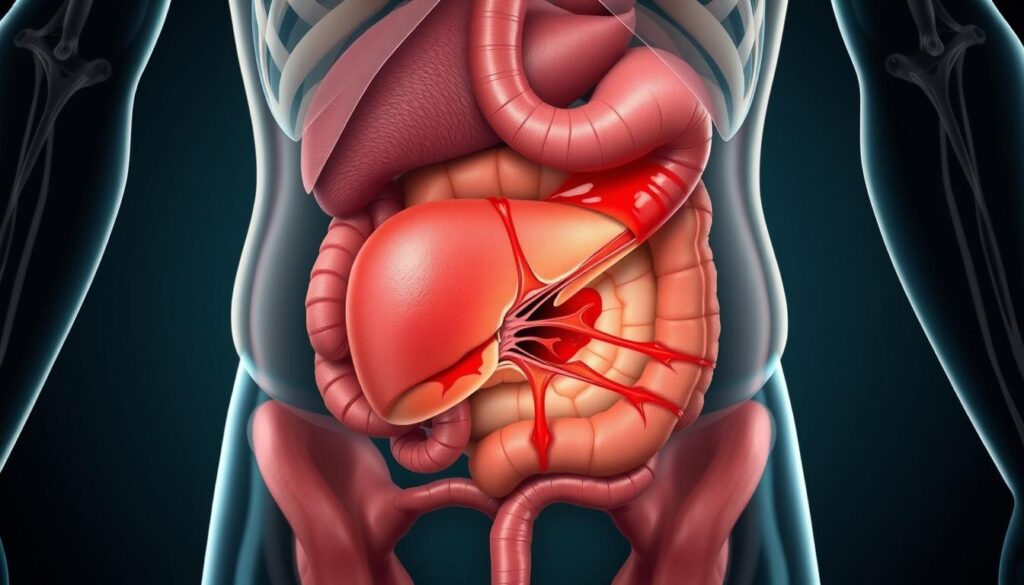A ruptured spleen is a critical medical emergency. It can turn a simple injury into a life-threatening situation. Abdominal trauma can make your body’s defense system vulnerable1.
Car accidents, sports injuries, and violent encounters often cause splenic injury1. Quick recognition of a ruptured spleen can save lives. The spleen fights infections and filters blood, making it vital for health1.
Some medical conditions increase the risk of splenic rupture1. These include infectious mononucleosis and hemolytic anemia. You can live without a spleen, but the risk of serious infections rises1.
Key Takeaways
- Ruptured spleen is a serious medical emergency
- Blunt trauma is the most common cause of splenic injury
- Quick medical intervention is critical
- Certain diseases increase the risk of spleen rupture
- Living without a spleen requires careful medical management
What is a Ruptured Spleen and Its Warning Signs
Knowing your body’s organs helps spot health risks. The spleen is key to your immune system and overall health2.
Location and Function of the Spleen
The spleen sits in your upper left abdomen. It’s about the size of your fist. This organ fights germs and filters blood2.
The spleen has several important jobs. It cleans blood and controls blood cell levels. It also removes damaged red blood cells and fights infections.
- Blood filtration
- Controlling blood cell levels
- Removing damaged red blood cells
- Fighting infections
Common Symptoms to Watch For
A ruptured spleen is serious. Look out for these ruptured spleen symptoms:
- Pain behind left ribs
- Abdominal tenderness
- Dizziness
- Rapid heart rate
Spleen problems can cause anemia, infection risks, and unusual bleeding or bruising2.
When to Seek Emergency Care
A splenic rupture needs immediate medical care. It makes up 10% of all abdominal injuries3. Get help fast for severe belly pain or bleeding signs.
Some symptoms may show up 40 days after an injury3. Always see a doctor if you suspect a serious problem.
Understanding Causes of a Ruptured Spleen
Blunt force trauma is a main cause of a ruptured spleen. Your risk of splenic injury depends on factors that can harm your spleen’s integrity4.
Sports and physical activities often lead to spleen ruptures. Contact sports raise your chances of blunt force trauma that could damage the spleen4.
The spleen is the most injured abdominal organ. It accounts for 42% of traumatic abdominal injuries4.
- Sporting accidents
- Vehicle crashes
- Physical altercations
- Accidental falls
An enlarged spleen, or splenomegaly, makes you more likely to have a rupture. Some medical conditions can cause spleen enlargement:
- Mononucleosis
- Hepatitis
- Blood disorders
- Liver diseases
Even minor trauma can cause a serious splenic injury when your spleen is already enlarged.
Non-traumatic splenic ruptures have unique traits. About 93% of these cases come from pathological causes5.
Males aged 18-34 are more likely to have these ruptures. The ratio is 2 males for every 1 female5.
You can’t fully prevent a ruptured spleen. But knowing your risks and taking care can help protect this vital organ4.
Conclusion
Spleen health needs careful attention to risks and treatments. Atraumatic splenic rupture is a complex medical issue requiring precise intervention6. Knowing potential symptoms aids early detection and effective trauma management7.
Medical pros may suggest different approaches for spleen injuries. Splenectomy is a crucial option for severe cases7. Some instances allow conservative treatment with monitoring.
However, high-grade splenic injuries often need surgery6. Recovery from spleen procedures requires patience and following doctor’s orders. Living without a spleen is possible but increases infection risks.
A comprehensive medical approach helps manage complications and ensure good health8. Understanding spleen health can save lives. Early detection, proper trauma care, and expert medical help are vital.
FAQ
What exactly is a ruptured spleen?
What are the main symptoms of a ruptured spleen?
What causes a spleen to rupture?
How is a ruptured spleen treated?
What is the recovery process like after a spleen injury?
Can you live without a spleen?
How can I prevent a ruptured spleen?
Source Links
- Ruptured Spleen – https://www.webmd.com/digestive-disorders/ruptured-spleen
- Spleen problems and spleen removal – https://www.nhs.uk/conditions/spleen-problems-and-spleen-removal/
- Splenic Injury | Korey Stringer Institute – https://koreystringer.institute.uconn.edu/splenic-injury/
- How To Recognize the Main Symptom of a Ruptured Spleen – https://www.health.com/ruptured-spleen-8638583
- Splenic Rupture – StatPearls – NCBI Bookshelf – https://www.ncbi.nlm.nih.gov/books/NBK525951/
- Spontaneous splenic rupture: A rare life-threatening condition; Diagnosed early and managed successfully – https://pmc.ncbi.nlm.nih.gov/articles/PMC3614379/
- Spontaneous splenic rupture: case report and review of literature – https://pmc.ncbi.nlm.nih.gov/articles/PMC7648463/
- Splenic Rupture Following Colonoscopy – https://www.facs.org/for-medical-professionals/news-publications/journals/case-reviews/issues/v4n1/foster-splenic-rupture/
